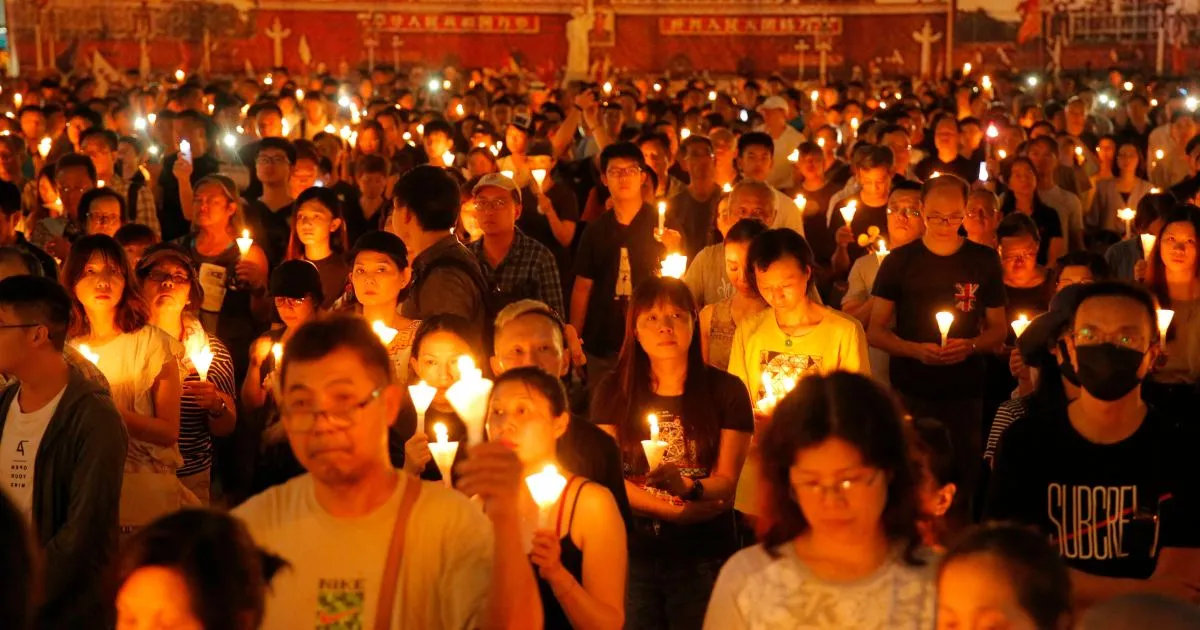Hong Kong begins national security trial for organisers of Tiananmen vigils | Crime News
Rights groups condemn trial of three activists accused of ‘inciting subversion of state power.’
A landmark trial of three activists who organised vigils marking China’s Tiananmen Square massacre has opened in Hong Kong.
Chow Hang-tung, Albert Ho and Lee Cheuk-yan, former leaders of the Hong Kong Alliance in Support of Patriotic Democratic Movements of China, are charged with “inciting subversion of state power” in the case before the Chinese territory’s High Court.
Recommended Stories
list of 4 itemsend of list
As they entered the courtroom on Thursday, Lee waved at his supporters, who waved back and said “good morning” to him.
Ho sat calmly, and Chow thanked her supporters for enduring the winds during the night and bowed to them.
Minutes later, Lee and Chow pleaded not guilty, while Ho entered a guilty plea.
About 70 people queued in the cold on Thursday morning for the public gallery, while dozens of police were deployed around the court.
Hong Kong used to host yearly candlelight vigils to mark Beijing’s deadly crackdown on demonstrators in Tiananmen Square on June 4, 1989, but those events have been banned since 2020.
That year, Beijing imposed a national security law on the former British colony in the wake of huge, sometimes violent pro-democracy protests.
Rights groups and some foreign governments have criticised cases brought against prominent pro-democracy figures under the law as a weaponisation of the rule of law to silence dissent.
“This case is not about national security – it is about rewriting history and punishing those who refuse to forget the victims of the Tiananmen crackdown,” said Sarah Brooks, Amnesty International’s deputy regional director, Asia.
Angeli Datt, research and advocacy coordinator at the Network of Chinese Human Rights Defenders, condemned the trial as a “sham”.
“If Hong Kong authorities actually follow the law, their only recourse is to drop all charges and immediately release the three organisers,” Datt said in a statement.
Beijing has said the security law restored stability to the city following the 2019 protests, which sent hundreds of thousands of people onto the streets.
Three government-vetted judges will preside over the trial, which is expected to last 75 days. Videos related to the alliance’s years of work will be part of the prosecution’s evidence.
The three-judge panel earlier dismissed an application by Chow to throw out the case.
“The court will not allow the trial to become, as [Chow] said, a tool for political suppression,” the judges wrote in a preliminary ruling.
The Hong Kong Alliance in Support of Patriotic Democratic Movements of China was founded in May 1989 to support protesters holding democracy and anticorruption rallies in Beijing.
The following month, China’s government sent tanks and soldiers to crush the movement on and around Tiananmen Square, a decision it has since heavily censored domestically.
The Alliance spent the next three decades calling on Beijing to accept responsibility, free dissidents, and embrace democratic reform.
Its candlelight vigils in Hong Kong’s Victoria Park every June 4 routinely drew thousands.
The trial of Chow, Lee and Ho follows last month’s conviction of media tycoon Jimmy Lai, which drew international condemnation.
Lai was found guilty of conspiring to commit foreign collusion.
The city’s chief justice responded to the criticisms of Lai’s conviction on Monday, saying the judges deal “only with the law and the evidence, not with any underlying matters of politics”.
